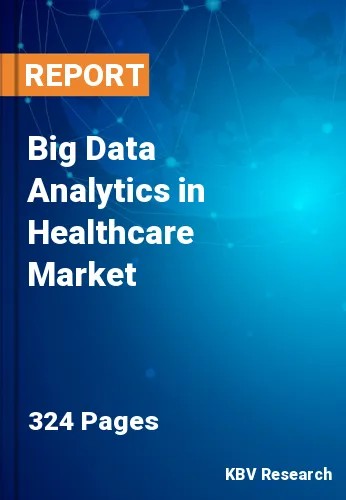
The Global Big Data Analytics in Healthcare Market size is expected to reach $130.2 billion by 2029, rising at a market growth of 19.7% CAGR during the forecast period.
Big data analytics in healthcare refers to the intricate process of poring over large amounts of data to unearth information like occult patterns, undiscovered connections, market trends, and customer preferences that may assist healthcare providers in making wise clinical and commercial decisions. Healthcare analytics is a vast field with many distinct topics, including clinical delivery, operational effectiveness, and personalized treatment.
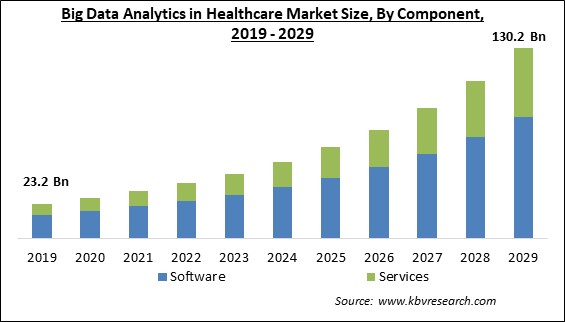
Big data analytics also enhances population health, integrates performance modeling with financial & predictive care monitoring, and other processes to improve process-oriented expenditures in the healthcare sector. The growth of big data analytics in healthcare market is result of the rise in regulatory compliance in the healthcare sector, growing need for big data analytics solutions for managing population health, rising expenditures by healthcare providers on technically sophisticated solutions, and continuous growth in the production of an enormous amount of medical data in the form of biometric data, electronic health records (EHR), and sensor data.
The use of large and complex heterogeneous datasets, like biological data, electronic health record records, and various omics datasets, is required to apply big data analytics in healthcare. Data analytics utilized in the healthcare industry are in great demand owing to the need to manage a patient's medical records and analyze the regularity with which that patient may experience similar health issues. The aforementioned scenario benefits both the big data technology and service sectors since, once a technology is embraced in a specific industry, it absorbs all available choices for revenue generation. These reasons will increase the demand for big data analytics in healthcare during the projected period.
Big data analytics firms extended their services to the healthcare sector to accommodate the various needs of their clients. Additionally, covid-19 has resulted in a significant number of fatalities, making it necessary to comprehend the traits and behavior of this pandemic to control it. The market demand has been significantly impacted by using big data analytics to quickly analyze and identify a vast volume of healthcare data. The pandemic led to an increase in the use of EHR in both developed and developing nations, which will affect the market's growth.
Hospitals are not the only businesses that use analytical platforms to acquire medical data from various studies, organize it, interpret it, look up past data, analyze it to spot trends and develop methods, tools, and technologies to get the best results. These data analytics platforms are also being used by policymakers to conduct data and model research to enhance judgments and policies connected to healthcare facilities and the delivery of care to patients. The American government has acted in this area, as evidenced by the HealthData.gov website, which compiles information from numerous government databases on topics including community health outcomes. These elements have caused the demand to increase during the anticipated period.
Healthcare enterprises are a prime focus for cyber attackers due to the abundance of confidential information they possess regarding their clientele. Studies indicate that many healthcare companies have experienced data breaches. In commerce, it is widely known that personal information holds significant value and profitability within the illicit market. Therefore, numerous enterprises utilize analytics to assist in mitigating security threats. The team detects any alterations in network activity or anomalous behaviors indicative of a potential cyber threat. Big data analytics in healthcare market is estimated to witness growth in the forecast period due to this.
The utilization of big data in the healthcare sector has a number of major drawbacks, one of which is loss of privacy. Monitoring patient data, organizing collected data, tracking medical assets & inventory, and presenting data on dashboards and reports are some of the applications of these big data technologies. The display of sensitive medical data, especially that of patients, infringes on privacy standards and casts a negative light on big data. The patient is denied absolute freedom because it gives doctors complete access to patient information from anywhere. As a result, during the projection period, demand for this service may decline due to such circumstances.
Based on analytics type, the big data analytics in healthcare market is segmented into descriptive analytics, predictive analytics, prescriptive analytics and diagnostic analytics. In 2021, the descriptive analytics segment held the highest revenue share in big data analytics in healthcare market. Descriptive analytics was extensively used to examine historical data & patient histories to study the spread of the virus, which has been a significant factor in the segment's growth. Getting historical data and transforming it into actionable insights, descriptive analytics has proven to be a valuable method for comprehending what occurred.
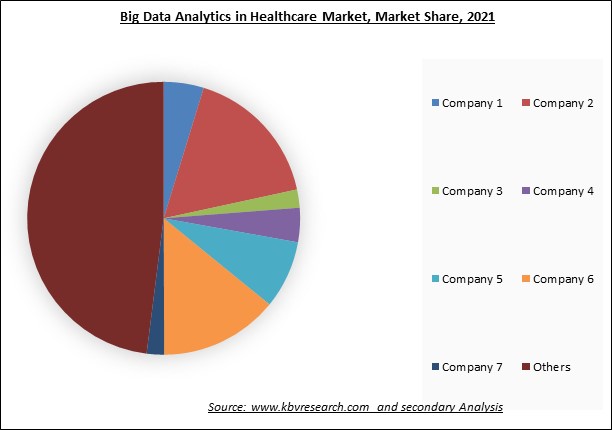
The leading players in the market are competing with diverse innovative offerings to remain competitive in the market. The illustration shows the percentage of revenue shared by some of the leading companies in the market. The leading players of the market are adopting various strategies in order to cater demand coming from the different industries. The key developmental strategies in the market are Partnerships & Collaborations.
By application, the big data analytics in healthcare market is bifurcated into clinical analytics, financial analytics and operational analytics. In 2022, the financial analytics segment recorded a remarkable revenue share in big data analytics in healthcare market. The expansion of this market has been attributed to the healthcare institutions' and organizations' ongoing efforts to reduce treatment costs while providing better care to patients. Healthcare organizations use analytical tools for both descriptive & predictive analysis to deliver enhanced patient care, reduce overall operational costs, and minimize fraud in insurance claims.
Based on end user, the big data analytics in healthcare market is categorized into hospitals & clinics, finance & insurance agencies, and research organizations. The finance & insurance agencies segment garnered a significant revenue share in the big data analytics in healthcare market in 2022. For many years, insurance businesses have been undergoing a digital transition. It has improved responsiveness, effectiveness, and accuracy in every division of insurance firms. The insurance industry benefits from advanced data and predictive analytics tools that enable data-driven business decisions
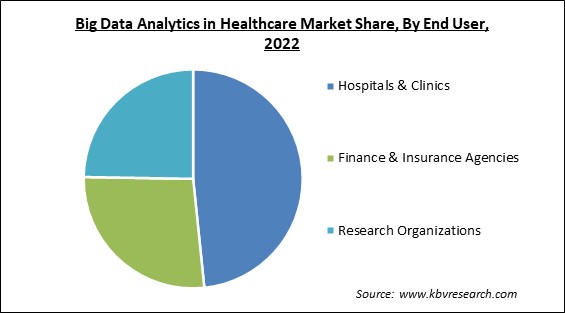
Based on deployment, the big data analytics in healthcare market is segmented into cloud and on-premise. In 2022, the on-premise segment dominated the big data analytics in healthcare market with maximum revenue share. The significant market share of this segment is primarily because on-premises deployment enables end users to use solutions from several providers, allowing for customization to meet end-user needs. In addition, due to convenience and security, most institutions install software and instruments to store data on-site, leading to a significant market share for this kind of delivery.
By component the big data analytics in healthcare market is divided into software and services. In 2022, the software segment held the highest revenue share in big data analytics in healthcare market. Massive amounts of clinical data have been generated due to the growing patient load on the healthcare system, the rise in disease prevalence, etc. Additionally, the market is growing due to the industry's unrelenting pressure to provide patients with better care, better outcomes, and more affordable treatments.
| Report Attribute | Details |
|---|---|
| Market size value in 2022 | USD 37.7 Billion |
| Market size forecast in 2029 | USD 130.2 Billion |
| Base Year | 2022 |
| Historical Period | 2019 to 2021 |
| Forecast Period | 2023 to 2029 |
| Revenue Growth Rate | CAGR of 19.7% from 2023 to 2029 |
| Number of Pages | 324 |
| Number of Table | 523 |
| Report coverage | Market Trends, Revenue Estimation and Forecast, Segmentation Analysis, Regional and Country Breakdown, Market Share Analysis, Competitive Landscape, Companies Strategic Developments, Company Profiling |
| Segments covered | Component, End User, Analytics Type, Application, Deployment, Region |
| Country scope | US, Canada, Mexico, Germany, UK, France, Russia, Spain, Italy, China, Japan, India, South Korea, Singapore, Malaysia, Brazil, Argentina, UAE, Saudi Arabia, South Africa, Nigeria |
| Growth Drivers |
|
| Restraints |
|
Region wise, the big data analytics in healthcare market is analyzed across North America, Europe, Asia Pacific and LAMEA. The North America region led the big data analytics in healthcare market by generating the highest revenue share in 2022. With the adoption of these platforms and the improvement of technical availability, the region now features cutting-edge medical facilities that have contributed to North America's market expansion. Hospitals and other businesses must now utilize analytics technologies owing to the rising prevalence of chronic diseases and the aging population. The presence of significant corporations on the market has also contributed to the astronomical income percentage.
Free Valuable Insights: Global Big Data Analytics in Healthcare Market size to reach USD 130.2 Billion by 2029
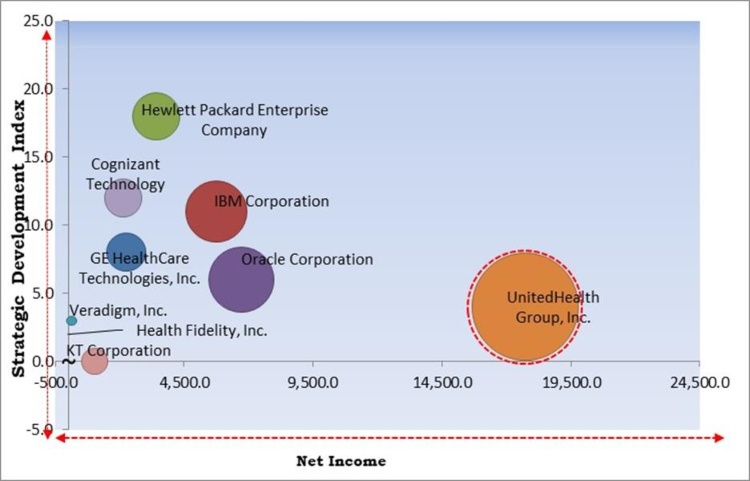
The major strategies followed by the market participants are Partnerships. Based on the Analysis presented in the Cardinal matrix; UnitedHealth Group, Inc. (Optum, Inc.) is the forerunner in the Big Data Analytics in Healthcare Market. Companies such as Hewlett Packard Enterprise Company, Cognizant Technology Solutions Corporation, and GE HealthCare Technologies, Inc. are some of the key innovators in Big Data Analytics in Healthcare Market.
The market research report covers the analysis of key stake holders of the market. Key companies profiled in the report include Oracle Corporation (Cerner Corporation), Veradigm, Inc., GE HealthCare Technologies, Inc., IBM Corporation, Epic Systems Corporation, UnitedHealth Group, Inc. (Optum, Inc.), Cognizant Technology Solutions Corporation, KT Corporation, Hewlett Packard Enterprise Company, and Health Fidelity, Inc. (Edifecs, Inc.)
By Component
By End User
By Analytics Type
By Application
By Deployment
By Geography
The Market size is projected to reach USD 130.2 billion by 2029.
These services help in preventing fraudulent activities by increasing security are driving the market in coming years, however, Privacy and security concerns restraints the growth of the market.
Oracle Corporation (Cerner Corporation), Veradigm, Inc., GE HealthCare Technologies, Inc., IBM Corporation, Epic Systems Corporation, UnitedHealth Group, Inc. (Optum, Inc.), Cognizant Technology Solutions Corporation, KT Corporation, Hewlett Packard Enterprise Company, and Health Fidelity, Inc. (Edifecs, Inc.)
The Hospitals & Clinics segment acquired maximum revenue share in the Global Big Data Analytics in Healthcare Market by End User in 2022 thereby, achieving a market value of $61.4 billion by 2029.
The North America market dominated the Market by Region in 2022, and would continue to be a dominant market till 2029; thereby, achieving a market value of $45.2 billion by 2029.
Our team of dedicated experts can provide you with attractive expansion opportunities for your business.
